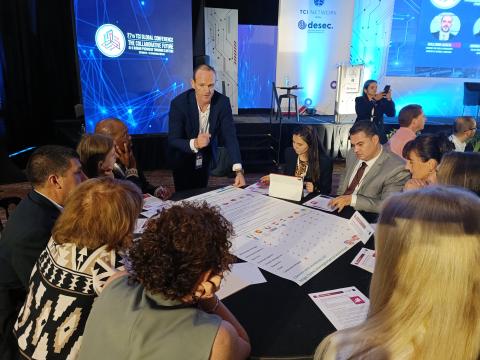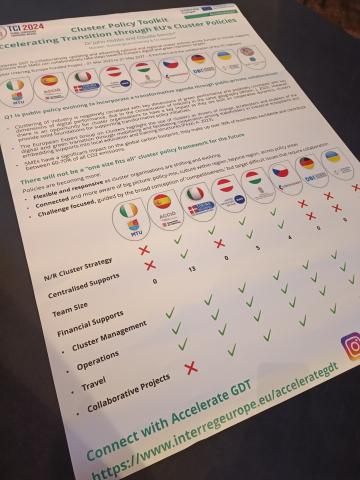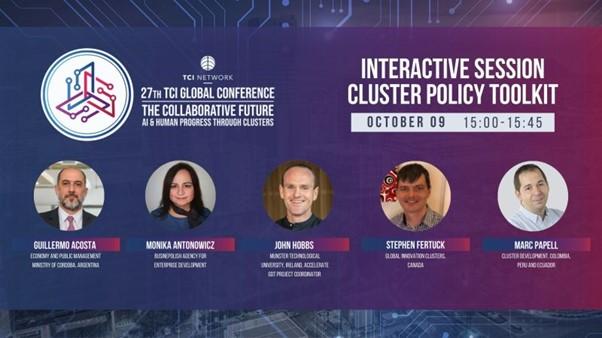Accelerate GDT at 27th TCI Global Conference MX
The Interreg Europe supported Accelerate GDT project was fortunate to be part of the TCI Network 27th Annual Global Conference, 8th to 10th of October 2024, which was hosted by Desarrollo Economico del Estado de Chihuahua A.C. (desec) in Chihuahua, Mexico.
It was a fascinating three full days of inspiring keynotes, dynamic panel discussions, insightful cluster visits, and vibrant networking opportunities. From impactful talks by keynote speakers Mariana Mazzucato and Rebeca Eun Young Hwang, to engaging panel discussions and enjoyable social events! It was a remarkable journey of #cluster learning, #collaboration, and worldwide connections. Accelerate GDT were well represented in Chihuahua with delegates from partners ACCIO, DBI, Hungarian National Development Centre and MTU attending.
Dr John Hobbs (MTU) and Claudia Soncin (TCI) had the opportunity to present learnings from the Accelerate GDT project in Chihuahua as part of the session:‘A Policy for the Future, from Traditional Cluster Policies to Transformative Agendas.” This took the form of an interactive session focused on the ‘Cluster policy toolkit.’ In the session 5 presenters were given a 3-minute pitch to invite members of the 250 strong attendees to come to a table where more detailed information on their policies and initiatives can be provided. Different perspectives from across the globe were showcased by Monika Antonowicz (Poland), Stephen Fertuck (Canada), Guillermo Acosta (Argentina), and Marc Papell (Colombia), all after some scene setting on advancing cluster policies from Emily Wise (Sweden), David Fernández Terreros (Spain) and Werner Pamminger (Austria).
Dr Hobbs and Ms Soncin focused on sharing how Accelerate GDT seeks to accelerate green and digital transition through supports for industry via EU Cluster Policies at a regional and national level. With their roots in deep triple-helix collaboration, clusters can be key assets on which to build more transformative policy agendas that require such collaboration to solve complex challenges.
Participants were asked to listen to the 3-minute proposals, then vote with their feet the tool/policy that interests you the most and then interact with that expert. Accelerate GDT attracted a large group of interested participants across 2 tables to discuss in more depth, two pertinent questions.
- Is public policy evolving to incorporate a transformative agenda through public-private collaboration?
- How do the different actors in your collaborative model interact to foster transformative agendas?

To address these questions, information from the kick-off, workshops and ecosystem analysis conducted as part of the Accelerate GDT project were shared in a poster (available here). Dr Hobbs spoke about how the project and our collaborations have made it clear that there will never be a “one size fits all” cluster policy, he states “it is evident that policies are becoming more: flexible and responsive as cluster organisations are shifting and evolving, connected and more aware of big picture: policy-mix, culture within region, beyond region, across policy areas and challenge or mission focused, guided by the broad conception of ‘competitiveness,’ but target difficult issues that require collaboration.”

Claudia Soncin, Project Manager, TCI Network when speaking about collaborative policy highlighted “that within the scope of the Accelerate GDT project each partner region, develops a stakeholder group to ensure that interregional learning does not only take place at an individual partner level, but also at ecosystem, organisational and stakeholder level. Along with partner organisations,’ stakeholder groups include participants from, government departments, academic institutions and cluster organisations to get a 360-degree participatory group of the triple helix engaged in clustering.”
The interactive session ended with participants being able to share their thoughts and ask questions about Accelerate GDT – and one topic of conversation related to how centralised policy makers can support co-ordination of a cluster policy. Peter Keller, National Development Centre who co-ordinates the Hungarian cluster policy was in attendance, and he noted that “a centralised team who manages and delivers the cluster policy can become experts, and provide all the necessary tools, supports and frameworks for strong cluster organisations to grow. The team can support funded clusters with training, marketing, promotion and link them to other government departments, policies, supports and activities. If coordinated well, there can be synergistic benefits for the entire economy which lead to increased shared value for all.”
Finally, a special thank you to our amazing hosts desec in Chihuahua for their hospitality and for creating such a welcoming environment, with a blend of top class presentations and learning opportunities, to networking and social events which allowed us to forge new connections and partnerships.
